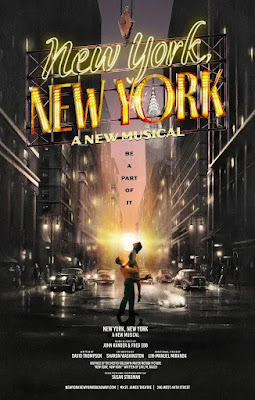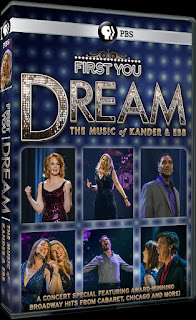JohnKander, composer of the newly opened musical THE VISIT,
shares the story of adapting "Zorba the
Greek" into the musical ZORBA!, which is being staged at City
Center beginning May 6.
"Life is what you do while you're waiting to die. Life
is how the time goes by." These are perhaps the starkest lyrics ever to
open a Broadway musical. But they perfectly establish the tone and mood of the
unyielding yet ultimately uplifting story which will unfold in ZORBA! which comes to City Center from May 6–10.
Based on the 1946 novel by Nikos Kazantzakis, ZORBA! is the tale of the unlikely friendship that forms on the island of Crete
between Nikos, a young educated writer, and Zorba, a boisterous and
worldly-wise working man. The musical, with music and lyrics by John Kander and
Fred Ebb
and book by Joseph
Stein, opened at the Imperial Theater in 1968 and ran for 305
performances. Starring Herschel Bernardi
as Zorba and Maria
Karnilova as Hortense and directed by Hal Prince,
the show received mixed critical reception, and the authors revised the show
for its 1970 national tour, which starred John Raitt
as Zorba and Chita
Rivera as the Leader.
In 1983, a Broadway revival ran for 362 performances and
reunited several key players from the 1964 film "Zorba the Greek":
director Michael Cacoyannis, Lila Kedrova
as Madame Hortense, and Anthony Quinn
himself, reprising his memorable performance as Zorba. That was the last major
New York production of the show until now.
At Encores!
it is always a special occasion when we have living authors to consult with.
While lyricist Fred Ebb passed away in 2004, composer John Kander is still going
strong at 88: CABARET
just completed another acclaimed Broadway run; the revival of CHICAGO is
in its 19th year; his new musical KID VICTORY recently premiered in
Washington, D.C.; and perhaps most significantly, Kander and Ebb's THE VISIT opened on Broadway in April. This is the first time that a composer of an
Encores! show has a new musical simultaneously opening on Broadway. I recently
had a conversation with Kander about his memories of the various productions of ZORBA!
ROB BERMAN: I noticed that your musical THE HAPPY TIME opened
in January of 1968, and ZORBA! opened in November of the same year. How
and when did you and Fred Ebb get involved with adapting "Zorba the
Greek" into a musical?
JOHN KANDER: I remember this rather specifically. Fred and I were in
L.A. working on THE HAPPY TIME. We rehearsed and opened out there in
great part because that's where [director] Gower Champion
lived. While we were there, Hal Prince had contacted us and asked us to read
"Zorba." He had an idea about making it into a musical. We did read
it and decided we didn't want to do it. We couldn't see it as a musical,
although it was not that we didn't think the material was wonderful. We were
very questioning. Well, Fred and I had rented a house together and there was a
phone way down in the yard and another phone in the house. I went down to the
extension phone down in the yard and Fred was in the house and we were
preparing to speak to Hal and say no, but then Hal started describing his
vision for the very opening scene, out of which the chorus Leader would appear.
By the time he finished describing this opening scene, we both enthusiastically
said yes.
Had you already seen the film?
JK:
By that time everyone had seen the film. But the film didn't enter into this
because we were forbidden from using anything from the film. Our major contact
and reference was the widow of Nikos Kazantzakis, who had passed away by then.
She was very encouraging and stayed connected with this piece for quite a
while. My memory is that she came over and saw it and approved it.
RB: I have to confess I never knew the show all that well and it
has been a wonderful discovery for me. Perhaps because of the Herschel Bernardi
connection, I always imagined that ZORBA! was similar to FIDDLER ON THE ROOF,
but set in Greece. [Bernardi created the role of Zorba, and had earlier played
Tevye.] But of course it couldn't be more different than that show. If
anything, I see similarities with CABARET in that both are stories about
a young writer visiting a foreign country and befriending a larger-than-life
character. Did that similarity ever cross your mind?
JK:
Not at the time. It did later. There was another similarity too in the way Hal
was approaching it. Since we're telling a story, there were observers onstage
and there were in CABARET as well.
RB: Tell me about the sound of the show and the incorporation of
Greek music and instrumentation into the score. Did you do any special research
at the time?
JK: The
first thing that happened is that I listened to lots and lots and lots of Greek
music. And then I forgot about it. I did the same thing with CABARET,
where I listened to lots and lots of German jazz and then forgot about it. I
made the assumption that I would just write with that influence in the back of
my head. I do know that the very first notes I wrote for ZORBA! were the
opening vamp to "Life Is."
RB: In addition to the ethnic instruments onstage (bouzoukis,
oud, dumbek), most of the strings in the original Broadway pit doubled on
mandolins and mandolas, but that appeared to have been simplified by
orchestrator Don Walker for the 1970 tour.
JK:
That was necessary. The interesting thing about the tour is that the final
version of the show happened with the tour. There was something musically not
quite complete about the version that was on Broadway. When we sent it out on
tour, we had a chance to write some new things. For instance, "Why Can't I
Speak" became a trio and we incorporated it with a new song for Nikos,
"That's A Beginning."
RB: I think the song "The Butterfly" is one of the
most beautiful songs you have written, and I like to imagine that it just
flowed effortlessly out of you. Do you remember it being an easy song to write?
JK:
I don't remember that being hard. We had little thematic things we kept coming
back to. In the construction of "The Butterfly," we found that little
returning theme of "Not too fast..." which was related to other
material in the show. I don't remember the show being hard to write. The score
also, I must say, was in great part an extension of Hal's vision. His use of
the Leader to help tell the story influenced us very greatly.
RB: The dance arranger of the original production was one of the
great unsung women of Broadway history, Dorothea Freitag.
JK:
Dorothea was a fantastic pianist, a marvelous character and musician. She wrote
a lot of dance music for Broadway. When we wrote 70, GIRLS, 70 we had a
character onstage called Lorraine and we wrote that part for Dorothea.
RB: You wrote a new song for Anthony Quinn in the revival.
JK:
Yes, which was called "Woman," which turned out well. Quinn and Lila
Kedrova were both wonderful in the piece, but it was a different kind of
experience. It became more of a star vehicle for Quinn.
RB: You've written so many wonderful shows. Does this one rank
in your mind in any way?
JK:
I think that from a writing point of view, Fred and I were starting to become
more adventurous, which was really fun, and Hal was very encouraging with that.
I remember the whole experience of ZORBA! right through opening night as
being a happy experience. It seemed like a clear piece of work.
at Playbill on-Line by Rob Berman (Music Director of Encores!) / Photos by Joan Marcus













